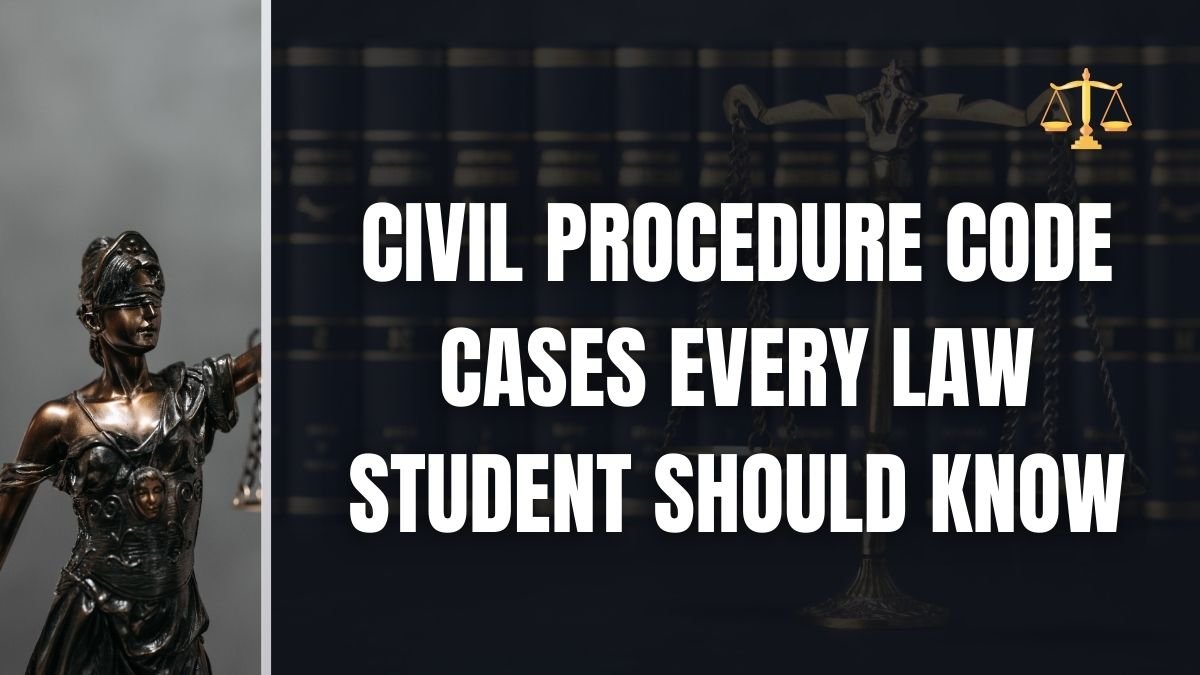Civil Procedure Code Cases: When two people or groups have a dispute they need rules to settle it fairly in court. That’s where the Civil Procedure Code 1908 comes in. Think of it as a rulebook for civil courts. It tells us about how to file a case, which court should hear it, what steps the judge should follow, how appeals, reviews or transfers of cases work.
The CPC does not decide who is correct or mistaken. Instead, it decides how the case will be heard so that justice can be done in a fair way. Over the time, the Supreme and High courts have explained these rules via important cases. These cases are like stories that teach us how the law works in real life and there are some of the Civil Procedure Code Cases Every Law Student Should Know.
Civil Procedure Code Cases Every Law Student Should Know
In law, there are two types of rules such as substantive law & procedural law. Substantive law tells us what our rights are and Procedural law tells how to use those rights in court. Without procedure, rights are useless.
Over the years, courts have explained how these procedures should work in real life via landmark judgements. Let’s check the Civil Procedure Code Cases Every Law Student Should Know.
Code of Civil Procedure 1908 – Key Cases In India
| Post Title | Civil Procedure Code Cases Every Law Student Should Know |
| Law Name | Code of Civil Procedure, 1908 |
| Type of Post | Landmark CPC Judgements |
| Target Audience | Law students, judiciary aspirants, practicing advocates, researchers |
| Court | Supreme Court of India |
| Relevance | Core list for civil law exam preparation |
| Category of the Post | Civil Procedure |
Top 5 CPC Landmark Cases In India
1. Baldev Singh V. Manohar Singh 2006
- Issue: Amendments of Pleadings
- What Court Said: Amendments of pleadings should be allowed if they help in deciding the real dispute between parties. Even if an amendment is filed late, it can be permitted as long as it does not unfairly harm the other side.
- Simple Rule: Courts should allow amendments if they are necessary for justice but not if they cause serious prejudice or delay.
2. Dhulabhai V. State of MP 1968
- Issue: Jurisdiction of Civil Courts
- What Court Said: Civil courts have jurisdiction unless a law clearly bars it. Even if jurisdiction is barred if the tribunal powers are limited or not adequate, civil courts can still step in.
- Simple Rule: Civil Courts are the default authority. Their jurisdiction can only be excluded if a law says so clearly.
3. Byram Pestonji Gariwala V. Union Bank of India 1992
- Issue: Can lawyers compromise or settle a case on behalf of their client without written authority?
- What Court Said: Yes, counsel / advocate can enter into a compromise or settlement on behalf of their client in court unless specifically prohibited.
- Simple Rule: Lawyers have implied authority to compromise a case for their client in court proceedings.
4. Salem Advocate Bar Association V. Union of India 2005
- Issue: Validity of CPC Amendments meant to speed up civil trials.
- What Court Said: Supported case management systems, court annexed mediation and affidavit evidence. Amendments were constitutional and necessary to reduce delays.
- Simple Rule: CPC Amendments to speed up justice are valid and courts must actively manage cases.
5. K.K. Velusamy V. N. Palanisamy 2011
- Issue: Use of Inherent Powers of Courts
- What Court Said: Courts can allow additional evidence or recall witnesses even at a late stage if justice demands. But this power should be used sparingly and not to delay trials.
- Simple Rule: Courts can use inherent powers to ensure justice and not to help parties misuse procedure.
FAQs
What is the Civil Procedure Code 1908?
The CPC 1908 is a law that sets out the rules and procedures for handling civil cases in India. It tells the court how to deal with suits, appeals, decrees, and more.
Who benefits from CPC 1908 Cases reading?
The CPC, 1908 Cases reading is for law students, researchers, and anyone who is interested in how civil courts function.
Where can law students access the CPC Cases Judgements?
Law students can access the CPC Cases Judgements on the official Supreme Court of India web portal or they can access via law blogs and other education portals.
What type of cases comes under the CPC?
CPC Covers civil cases like property disputes, contracts, family matters, injunctions, partition suits, recovery of money.
Does CPC apply all over India?
Yes, the CPC 1908 is applicable across India except Nagaland state and tribal areas and J&K.
Can Civil Procedure Code 1908 be amended?
Yes, CPC 1908 can be amended and in 1999 and 2002, the CPC was already amended.
